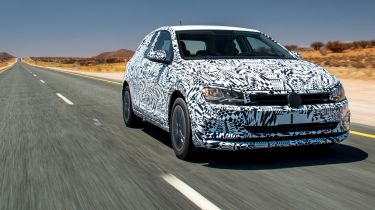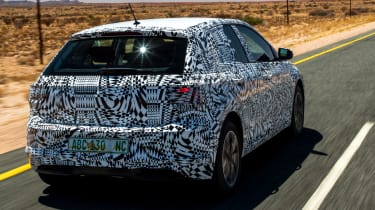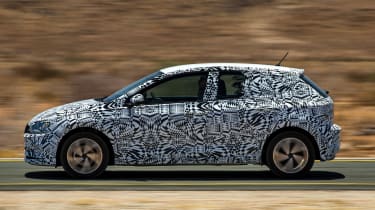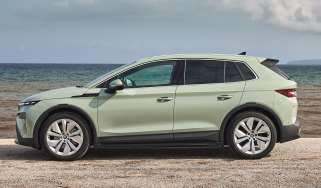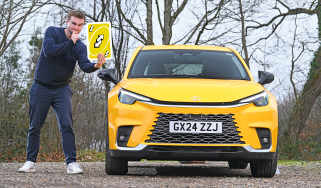New Volkswagen Polo 2017 prototype review
We take an exclusive drive in the next-generation version of VW’s Polo supermini and deliver the first verdict on this crucial model
This early drive reveals a Polo that’s likely to be even more comfortable, spacious and refined than the current excellent model. SEAT’s latest Ibiza has proven how good the new MQB A0 platform can be, and the Polo is set to be similarly impressive.
Volkswagen’s new Polo isn’t due in showrooms until the end of the year, and we won’t even see official pictures until the car’s unveiling in the summer, but Auto Express has already been behind the wheel of this crucial new model on a secret test with VW engineers in South Africa.
There are currently no official details on anything other than engines, but we drove the new, three-cylinder 94bhp 1.0-litre in an early, disguised prototype. In spite of the car’s camouflage inside and out, it’s clear that the new Polo’s styling will be evolutionary. However, what lies underneath is more revolutionary – it’s the VW Group’s new MQB A0 small-car platform that will be used in everything from the new SEAT Ibiza to a brand new range of small SUVs.
Although the Polo’s overall dimensions look pretty similar to the outgoing car’s, it’s clear that the wheels have been pushed further apart to increase the wheelbase – possibly equalling the Ibiza’s own wheelbase boost of 95mm. That means there’s excellent rear space for a supermini, enabling larger adults to sit comfortably in the back. Head and shoulder room seems to have been improved, too.
It’s the same up front, where – in spite of the hefty dashboard coverings – we know the style will be very similar to that of the outgoing car. We’d expect there to be squishy plastics on the dashtop where the Ibiza’s are harder, while the digital Active Info Display to replace traditional dials, plus a large touchscreen infotainment system, are both expected to be optional.
More reviews
Car group tests
- Skoda Fabia vs Volkswagen Polo: 2023 twin test review
- Ford Fiesta ST vs Volkswagen Polo GTI vs Hyundai i20 N: 2022 group test review
- Volkswagen Polo vs SEAT Ibiza vs Hyundai i20: 2021 group test review
In-depth reviews
Road tests
Used car tests
The technology count will get a further boost thanks to the MQB A0 platform. We know that autonomous emergency braking and adaptive cruise control will be featured, as our well used prototype had a dashboard warning light that the engineer accompanying us on our drive told us meant “front assist isn’t working”.
What our 25-minute drive on mostly long, straight, dusty roads did tell us was that the new Polo feels very much like a Golf, sharing the Ibiza’s new, more mature feel. The ride is supple, with a little pitching over some bumps, but comfort has clearly been a priority. Refinement has also taken a step forward, even with regard to the tiny three-cylinder powerplant under the bonnet. There’s a vaguely sporting hum to the engine note under full load, while wind noise is well suppressed and tyre noise similarly distant, even on this prototype.
The engine is best suited to gentle progress, however. There were no reports of any mechanical issues, but our car struggled to keep pace with a swiftly driven convoy of camouflaged Volkswagens. With full throttle and up a gentle incline, this early model just about managed to maintain motorway speeds, with a gear drop required to keep momentum or when we had to pass slower traffic. We’d expect things to be better on a production model that hadn’t been subjected to such extremes of heat and performance, though.
The few bends we did encounter revealed a very Golf-like feel to the steering: stable and precise, but lacking in feedback. And the suspension’s orientation towards comfort meant a little body lean, too.
We’ll reserve judgement on the 94bhp engine until we’ve driven a production car, but you won’t be short of alternatives. Versions of the 1.0-litre will offer 64bhp, 73bhp and 114bhp in addition to this model. The new 1.5-litre petrol engine from the latest Golf will be offered with 148bhp, along with a new 197bhp GTI.
VW will also persevere with diesels, with 79bhp and 94bhp 1.6-litres. Auto DSG boxes will be available on all bar the least powerful two petrols and diesel, while prices are expected to be slightly above the current car’s, so closer to £13,000 than today’s sub-£12,000 starting point.

